Countries are launching alliance strategies to compete for the right to formulate 6G standards

|
As many countries have suffered losses in the pace of 5G deployment, in order to no longer be controlled by others in the next generation mobile network 6G, many countries are actively developing 6G and hope to become the standard setter. In this battle in the next decade, forming alliances will become one of the keys to victory.
This trend can be seen from the recent cooperation between many countries. For example, the Finnish 6G flagship research program coordinated by the University of Oulu and the Beyond 5G Promotion Alliance of the Ministry of Internal Affairs and Communications of Japan signed an agreement in June 2021 to jointly cooperate in the field of 6G technology that has not yet been standardized. The goal of this cooperation is to make a significant contribution to the global standardization and regulatory development of 6G technology. At the same time, the United States and the United Kingdom also announced plans to develop a detailed science and technology cooperation agreement, which will include a strategic cooperation clause on the development of 6G technology. From now until 2022, the two countries said they will develop a statement of intent focused on advancing proposals on future technologies such as 6G and strengthening cooperation on digital technology standards. This cooperation is part of the Atlantic Charter signed by US President Biden and British Prime Minister Johnson. In addition to 6G, the revised charter will cover cooperation to improve the resilience of key supply chains; help promote emerging fields such as AI and quantum technology; and enhance the accessibility and mobility of data to support economic growth, public safety and scientific progress. In fact, as early as April 2021, the United States and Japan signed an agreement to cooperate in investing in the research, development, testing and deployment of secure networks and advanced ICT (including 5G and next-generation mobile networks), and invested $4.5 billion in this work. At the end of April that year, the National Science Foundation invited nine technology and telecommunications giants to participate in a new public-private partnership program aimed at laying the technical foundation for 6G. In addition, Samsung Research Institute, Samsung Research America, and the University of California, Santa Barbara, all under Samsung Electronics of South Korea, presented research on the potential impact of terahertz on next-generation 6G technology at the Terahertz Communications Symposium held at the IEEE International Communications Conference (ICC 2021) in June 2021. They were end-to-end 140GHz wireless links using a fully digital beamforming solution. According to ABI Research, a global technology market advisory firm, initial commercial deployment of 6G technology is expected to begin between 2028 and 2029. As for the first standard of 6G, it is expected to be ready in 2026. This has driven projects, initiatives and alliances launched by many other countries, including China, South Korea, the European Union and the United States, to shape the 6G framework and key commercial priorities. |
<<: 5G IoT may be the next opportunity
>>: Redis: How do I communicate with the client?
Recommend
There have been three waves of "network withdrawal" around the world. When will domestic operators complete the withdrawal of 2/3G networks?
Recently, Ericsson released the ten-year special ...
The battle for Wi-Fi 7 is about to begin
The summer of 2022 is coming, and the person to t...
my country has initially built the world's largest 5G mobile network
"Since the implementation of network speed-u...
5G unlocks new solutions for the medical industry
5G unlocks new solutions for the medical industry...
China Radio and Television faces three major challenges on its 5G journey
Since the Ministry of Industry and Information Te...
Zhao Houlin: Broadband development has made remarkable achievements, but there are still considerable challenges. The global industry needs to fully cooperate.
The digital divide has not yet disappeared, and t...
Good news for 5G! China ranks first in the world in 6G patents, and many countries are investing heavily to catch up
As a developing country, China's internationa...
ZJI newly launched Hong Kong cluster server, 4C segment 238 IP monthly payment starts from 1400 yuan
This month, ZJI launched a new server cluster in ...
The love-hate relationship between TCP and UDP
Recently, the epidemic in Qiaoxi District, Shijia...
Han Xia from the Ministry of Industry and Information Technology: my country's 5G standard essential patents account for more than 38%, ranking first in the world
[[420845]] On August 31, the 2021 World 5G Confer...
A brief introduction to ZAB protocol in Zookeeper
The full name of the ZAB protocol is Zookeeper At...
5G CPE replaces fiber-to-the-home, and demand is booming in Europe, America and rural areas
2019 is known as the first year of 5G. In fact, s...
Is our 5G field booming? Many regions are actively deploying, and the future development potential is worth paying attention to
As an important direction for the evolution and u...
China Telecom: Continue to build a comprehensive 5G private network solution integrating "network edge cloud and service"
With the continuous advancement of "new infr...
Cisco Meraki officially landed in China, ushering in a new era of networking
Today, the Cisco Meraki new product launch confer...




![[Black Friday] edgeNAT: 20% off for monthly VPS and 30% off for annual VPS, top up 500 yuan and get 100 yuan free](/upload/images/67cac24339ff5.webp)




